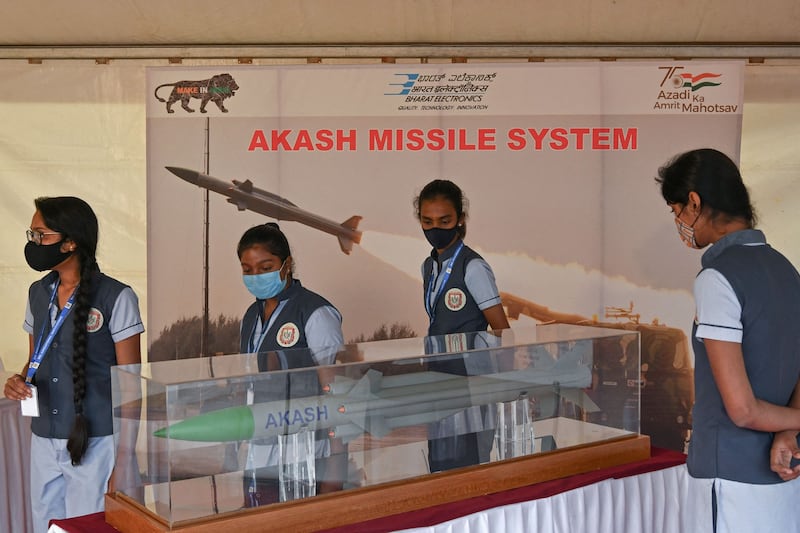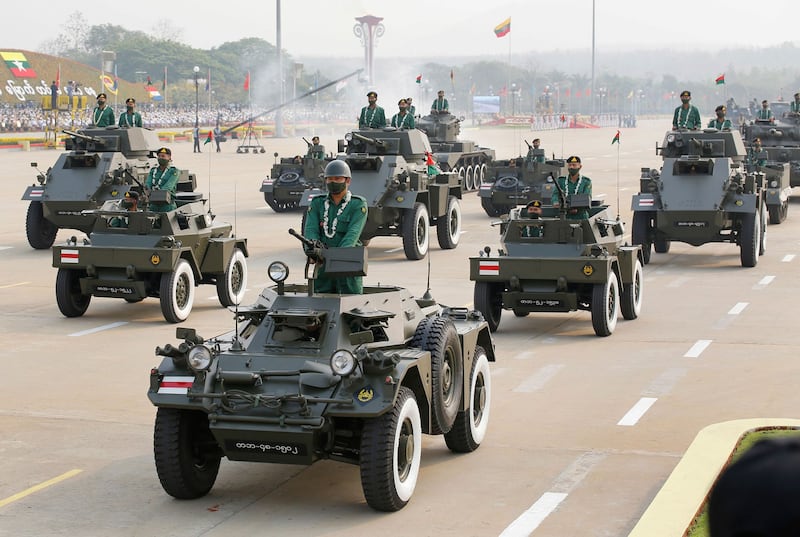Companies in India are supplying weapons to Myanmar’s junta while Prime Minister Narendra Modi expresses concern about the political crisis in Myanmar on the international stage, observers said Monday, highlighting the two-faced nature of the strategy.
Indian arms manufacturer Bharat Electronics Limited, or BEL, transferred military equipment worth more than US$5.1 million to Myanmar's army or known Myanmar arms brokers Alliance Engineering Consultancy and Mega Hill General Trading over a period of six months from November 2022 to April 2023, the rights group Justice for Myanmar reported in June.
The military equipment included metallic sonar domes; transducers and gaskets for the domes to be used on frigates, warships or submarines; directing gear systems; technical documents; various items for radio transmission or radar equipment; and manpack radios for battlefield communication.
Justice for Myanmar called the shipments “part of a pattern of Indian support for the Myanmar military and its domestic arms industry” and called on India’s allies to use their leverage to “pressure India to stop the supply of arms and dual use goods and technology” to the regime, including during Modi’s state visits to the U.S. and France this year.
The weapons sales come even as Modi and U.S. President Joe Biden issued a joint statement following their meeting at the White House on June 22 expressing concern about the worsening rights situation in Myanmar and calling for the release of the country’s political prisoners.

Than Soe Naing, a political analyst, pointed out the hypocrisy of India selling weapons to the junta with one hand while saying it is concerned with the situation in Myanmar on the other.
He noted that India has stayed neutral amid the ongoing conflict in Myanmar and neglected or even arrested refugees who have fled fighting across its border.
“But on the international arena, when making a statement as a democratic country, it uses the terms ‘democracy and human rights,’” he told RFA. “It doesn’t make any sense. It is a government that is indirectly supporting the crimes committed by the Myanmar military by willfully ignoring them.”
Justice for Myanmar’s report came on the heels of one released in May by U.N. Special Rapporteur on the situation of human rights in Myanmar Tom Andrews, who said the junta had imported at least US$1 billion in arms and raw materials to manufacture weapons between the Feb. 1, 2021, military coup d’etat and December 2022.
Rights groups say the junta is using such weapons against the people of Myanmar, including to attack the armed resistance and civilians who oppose its rule.
While Russia, China and Singapore were the major sources by far, the U.N. report found that Indian entities, including state-owned entities, had transferred US$51 million in arms and related materials to the junta over the same period. That followed Russia’s US$406 million, China’s US$267 million, and Singapore’s US$254 million.
Selling weapons for war crimes
Ko Mike, a spokesman for the Blood Money Campaign, a collective of Myanmar activists campaigning to stop revenues reaching the junta, said that Indian companies selling weapons to Myanmar are abetting war crimes.
“They are supporting killings by a terrorist group [the junta] that is committing the worst crimes in the world,” he said. “Sometime in the future, it will be necessary to do something internationally about accountability [for such entities].”
Ye Tun, a political analyst, said that Modi appears to believe the junta is responsible for maintaining stability in Myanmar.
“So if you [maintain stability] by using weapons, India will sell weapons to Myanmar’s military [to support such alleged efforts].”
Prior to the sales detailed in Justice for Myanmar’s latest report, the group noted that Indian state-owned arms producer Yantra India Limited shipped multiple 122mm howitzer barrels to the junta in October 2022 in an apparent breach of international law.

The Indian government has so far ignored calls by civil society organizations and the people of Myanmar, including the shadow National Unity Government, or NUG, and failed to comply with U.N. resolutions and its responsibilities under international law, said Justice For Myanmar spokesperson Yadana Maung.
Radio Free Asia attempted to contact the Indian Embassy in Myanmar by email for comment but received no response. Calls to junta Deputy Information Minister Major Gen. Zaw Min Tun, seeking comment on the claims, went unanswered Monday.
Regional stability at risk
Thein Tun Oo, the executive director of the Thayninga Institute for Strategic Studies, which is made up of former military officers, called it “normal” for India to assist its neighbor.
“India can stand on its own two feet and cooperate with anyone it wants to,” he said. “India has taken Myanmar as a partner ... [because] Myanmar is the best country for India to cooperate with on the security of the Indian Ocean. So, it is normal for India to cooperate with Myanmar.”

But NUG spokesman Kyaw Zaw said that as the world’s largest democracy, India is expected to embrace democratic values and not prop up regimes that oppress their own people.
“We hope that India will try to understand the will of the people of Myanmar and help them to fulfill that will,” he said.
If India instead continues to support the junta, he said, there will be no resolution to the conflict in Myanmar and the stability of the region will be at risk.
Translated by Htin Aung Kyaw. Edited by Joshua Lipes and Malcolm Foster.
